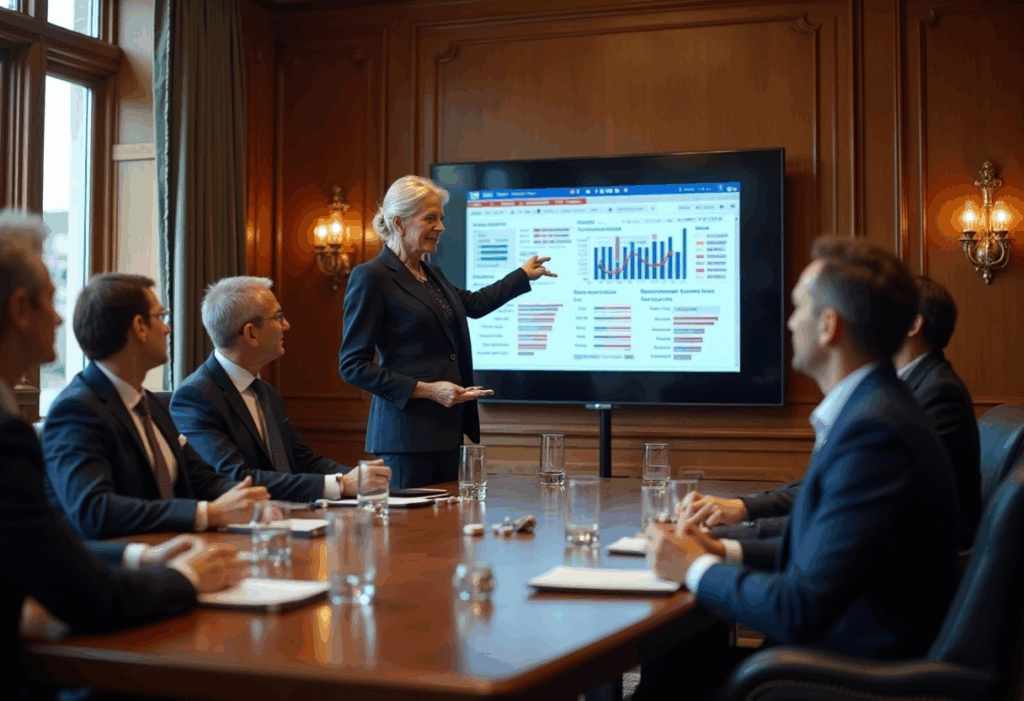How to Become a Political Consultant in the UK: Your Expert Guide
Imagine being at the heart of the action, steering political campaigns, shaping public policy, and leading candidates to victory. If you’re drawn to the dynamic and high-stakes world of UK politics, then a career as a political consultant could be your perfect calling. This comprehensive guide provides a clear roadmap, offering an in-depth look at what the role entails, the precise steps you need to take, and the vital skills, education, and experience required for success. Drawing from insights provided by reputable industry sources such as Parli-Training, we aim to address all your queries, from potential earnings to career advancement, all while maintaining a friendly yet professional approach. Let’s embark on this journey together and explore how you can transform your passion for politics into a thriving and impactful career.
In the bustling political landscape of the United Kingdom, where national and regional governance intersect with a vibrant media environment and engaged citizens, a political consultant serves as a crucial strategic advisor. These professionals guide clients—be they candidates, political parties, businesses, or advocacy groups—toward achieving their political or policy goals. Whether it’s securing an election win, influencing public opinion, or advocating for legislative changes, these experts work behind the scenes, skillfully combining creativity, data analysis, and effective communication to develop winning strategies.
Understanding the Core of Political Consulting
A political consultant is a strategic advisor who helps clients—candidates, political parties, businesses, or advocacy groups—achieve their political or policy objectives. Whether it’s winning an election, shaping public opinion, or lobbying for legislative change, consultants are the masterminds behind the scenes, blending creativity, data analysis, and communication to craft winning strategies. In the UK, this role is particularly vibrant, given the country’s complex political landscape, which spans national and regional governance, a robust media environment, and an engaged civil society.
What Does a Political Consultant Do?
The job is varied and fast-paced, with tasks tailored to the client’s goals. On any given day, you might:
- Design Campaign Strategies: Create comprehensive plans for elections or advocacy campaigns, including messaging, voter targeting, and media outreach.
- Manage Public Image: Craft speeches, press releases, or social media posts to shape how a candidate or organisation is perceived.
- Conduct Research and Analysis: Dive into polling data, voter demographics, or policy trends to inform strategies.
- Handle Media Relations: Pitch stories to journalists, manage press conferences, or navigate media crises.
- Lead Digital Campaigns: Oversee social media strategies, online advertising, or content creation to engage voters.
- Advise on Fundraising: Develop plans to secure financial support for campaigns or advocacy efforts.
- Lobby for Policy Change: Work with businesses or non-profits to influence legislation or government decisions.
You’ll collaborate with specialists like pollsters, data analysts, and PR professionals, and you’ll need to stay agile as political events unfold. The role often involves long hours, especially during election periods, and requires a knack for thriving under pressure.
Why Choose This Career?

Political consulting is a career for those who love the thrill of politics and want to make a tangible impact. In the UK, you could help elect an MP, shape national policy, or amplify a grassroots movement. The diversity of the work—from crafting a viral social media campaign to briefing a candidate before a debate—keeps things exciting. Plus, the UK’s political system, with its mix of parliamentary democracy, devolved governments, and active advocacy groups, offers endless opportunities to leave your mark.
That said, the job isn’t without challenges. Expect irregular hours, intense deadlines, and the need to navigate polarised public debates. You’ll also face scrutiny, as campaigns are often in the spotlight. If you’re energised by these challenges and eager to shape the political landscape, this could be the career for you.
Who Thrives in This Role?
Successful political consultants tend to share a few traits:
- Passion for Politics: A deep interest in how government and society work.
- Strategic Thinking: The ability to see the big picture and plan several steps ahead.
- Resilience: Comfort with high-pressure situations and setbacks.
- Communication Skills: A knack for crafting persuasive messages and engaging diverse audiences.
- Adaptability: The ability to pivot when plans change or crises arise.
If this sounds like you, let’s break down the steps to get started.
Your Roadmap to Becoming a Political Consultant
1. Assess Your Fit for the Role
Before diving in, take a moment to reflect on whether political consulting aligns with your goals and personality. This career demands enthusiasm, grit, and a willingness to work in the public eye. Ask yourself:
- Do you enjoy crafting strategies that influence opinions or outcomes?
- Are you comfortable with long hours and unpredictable schedules, especially during elections?
- Can you handle criticism or setbacks without losing focus?
To get a clearer picture, explore the industry. Read books like The War Room by Philip Gould or Campaigns That Shook the World by Danny Rogers for insights into campaign life. Follow UK political consultants on LinkedIn or X, and check out resources from Parli-Training to understand the skills and experiences required. Talking to professionals in the field, even informally, can also help you gauge if this is the right path.
2. Build a Strong Educational Foundation
While there’s no single degree required, a solid education gives you the knowledge and credibility to stand out. Most political consultants hold a bachelor’s degree in a related field, and some pursue postgraduate study for an edge in competitive roles.
Recommended Degrees
Here are some fields that align well with political consulting:
- Politics or Political Science: Offers a deep dive into political systems, ideologies, and policy-making. Universities like Oxford, LSE, or King’s College London have strong programmes.
- Public Administration: Focuses on government operations and policy implementation, ideal for policy-focused roles.
- Communications or Media Studies: Builds skills in messaging, media relations, and public engagement. Institutions like Cardiff University excel in this area.
- Law: Useful for consultants working on legislative advocacy or regulatory affairs. UCL and Cambridge are known for rigorous law programmes.
- International Relations: Relevant for roles involving global campaigns or EU-related work, offered by universities like St Andrews or SOAS.
A bachelor’s degree is typically enough to enter the field, but a master’s in public policy, political management, or public affairs can open doors to senior positions. For example, the Chartered Institute of Public Relations (CIPR) offers a Public Affairs Diploma, which is highly regarded for developing strategic skills. Universities like UCL or the University of Westminster also offer master’s programmes in public policy or political communication.
Alternative Pathways

If a degree isn’t feasible, don’t let that stop you. Short courses and certifications can provide targeted skills and show employers you’re committed. Parli-Training offers practical options like:
- Basic Parliamentary Procedure: Teaches the workings of Westminster.
- Political Lobbying: Covers strategies for influencing policy.
- Introduction to Political Research: Builds skills in data analysis.
Other organisations, like the PRCA or the Institute of Public Affairs, offer workshops and certifications in public affairs or campaign management. Online platforms like Coursera or FutureLearn also have courses in political communication or digital marketing, which can complement your CV.
Choosing the Right Institution
When selecting a university or course provider, consider:
- Reputation: Look for institutions with strong politics or communications programmes, like LSE, UCL, or Edinburgh.
- Networking Opportunities: Universities with ties to Westminster or industry internships can help you build connections.
- Practical Focus: Courses that include simulations, case studies, or placements (like those at King’s College London) are especially valuable.
3. Gain Practical Experience
Experience is the cornerstone of a career in political consulting. Employers want to see you can apply your knowledge in real-world settings, so start building your CV early through internships, volunteering, and entry-level roles.
Internships
Internships are a fantastic way to learn the ropes and make connections. They expose you to campaign dynamics, policy processes, and the inner workings of government. Look for opportunities with:
- Political Parties: Labour, the Conservatives, Liberal Democrats, or smaller parties like the Greens often offer internships, especially during elections.
- MPs’ Offices: Many MPs hire interns to assist with research, communications, or constituent work.
- Think Tanks and Advocacy Groups: Organisations like the Fabian Society, Institute for Public Policy Research, or Amnesty International provide experience in policy or campaigning.
- Consultancies: Firms like Hanbury Strategy or Portland Communications sometimes offer internships.
Check sites like W4MP or Indeed for openings, and apply early, as competition can be fierce. Even a short internship can give you valuable insights and a foot in the door.
Volunteering
Volunteering is a great way to gain experience if paid roles are hard to find. It also shows your passion for political or social causes, which employers value. Consider:
- Canvassing for Campaigns: Knocking on doors for a local councillor or MP candidate teaches you about grassroots politics.
- Supporting Advocacy Groups: Helping charities like Shelter or Greenpeace with their campaigns builds messaging and organising skills.
- Community Organising: Leading local events or initiatives demonstrates leadership and project management.
Volunteering opportunities are often advertised through party websites, local councils, or platforms like Do-it.org. Even a few months of volunteering can add weight to your CV.
Entry-Level Roles

Working in an MP’s office or a related political role is one of the best ways to gain relevant experience. Common positions include:
- Parliamentary Researcher: Conducting research on policy or legislation for an MP.
- Caseworker: Handling constituent queries, which teaches you about voter priorities.
- Communications Assistant: Managing social media, press, or public engagement.
These roles give you a front-row seat to the political process and help you build a network. Parli-Training recommends spending around 18 months in an MP’s office to develop a deep understanding of government workings. Constituency-based roles, like caseworker, are particularly valuable for learning how to connect with voters.
You can also explore roles in local government, political parties, or non-profits. For example, working as a campaign coordinator for a charity or a policy officer for a trade union can provide transferable skills.
4. Develop Essential Skills
Political consulting requires a diverse skill set, blending technical expertise with interpersonal strengths. Here’s what you need and how to build it.
Communication
Clear, persuasive communication is the backbone of the job. You’ll write speeches, pitch to journalists, and present strategies to clients. To improve:
- Join a public speaking club like Toastmasters to build confidence.
- Take writing workshops or Parli-Training’s Letter Writing Master Class, which teaches how to craft professional policy responses.
- Practice distilling complex ideas into concise, compelling messages.
Analytical Thinking
Consultants rely on data to guide strategies, whether it’s voter trends or policy impacts. Strengthen your skills by:
- Learning to interpret polling data and statistical trends using tools like Excel, SPSS, or Tableau.
- Conducting research on political issues or legislative proposals.
- Taking courses like Parli-Training’s Introduction to Political Research to master data analysis.
Problem-Solving
Politics is unpredictable, so you’ll need to think on your feet. Build this skill by:
- Role-playing campaign scenarios with peers or mentors.
- Studying case studies of campaigns (e.g., the 2016 EU referendum) to understand what worked or failed.
- Participating in debates or strategy discussions to sharpen critical thinking.
Networking
Relationships are vital in this industry. To build your network:
- Attend political events, party conferences, or industry gatherings, like those hosted by the PRCA.
- Join political party organisations, student societies, or advocacy groups.
- Connect with professionals on LinkedIn or engage with their posts on X.
Digital Proficiency
Modern campaigns rely heavily on digital tools. Get comfortable with:
- Social media platforms (X, Instagram, TikTok) for voter engagement.
- Digital advertising platforms like Google Ads or Meta Ads.
- Content creation tools for videos, graphics, or podcasts (e.g., Canva, Adobe Premiere).
Parli-Training’s Video Production or Advanced Social Media Management courses can help you stay ahead of the curve. Free resources like YouTube tutorials or Google’s Digital Garage can also build your skills.
Emotional Intelligence

Consultants often work with diverse stakeholders, from candidates to voters. Emotional intelligence helps you:
- Navigate sensitive issues with tact.
- Build trust with clients and colleagues.
- Manage conflicts or crises calmly.
Practice active listening, seek feedback on your interpersonal skills, and reflect on how you handle stress.
5. Specialise in a Niche
As you gain experience, consider focusing on a specific area to stand out. Specialisation can make you a go-to expert and boost your career. Common niches include:
- Campaign Management: Overseeing entire election strategies, from planning to execution.
- Media Relations: Managing press coverage and public appearances.
- Polling and Data Analysis: Interpreting voter trends and survey data.
- Fundraising: Securing financial support for campaigns.
- Digital Strategy: Leading online campaigns and social media efforts.
- Policy Advocacy: Lobbying for legislative or regulatory changes.
You can develop your niche through targeted courses, certifications, or hands-on experience. For example, Parli-Training’s Political Campaigning course covers multi-platform advocacy, while Parliament for Press Officers focuses on media strategies. Joining a consultancy that specialises in your area of interest can also help you hone your expertise.
6. Create a Standout Portfolio
A portfolio is your chance to showcase your skills and experience to potential employers or clients. It should include:
- Campaign Materials: Press releases, speeches, social media posts, or ads you’ve created.
- Case Studies: Descriptions of campaigns or projects you’ve worked on, highlighting your role and the results.
- Research or Analysis: Policy briefs, polling reports, or data visualisations that demonstrate your analytical skills.
If you’re just starting out, include work from internships, volunteering, or university projects. For example, a social media plan you developed for a student society campaign or a policy analysis from a coursework assignment can work well. Keep your portfolio concise, professional, and tailored to the roles you’re applying for. Consider hosting it online using platforms like WordPress or LinkedIn to make it easily accessible.
7. Break Into the Job Market or Go Freelance
Once you’ve built your education, experience, and skills, it’s time to start your career. Political consulting roles are available in various settings:
- Political Consultancies: Firms like Hanbury Strategy, Portland Communications, or Whitehouse Communications work with multiple clients, from candidates to corporations.
- Political Parties: Labour, Conservatives, Liberal Democrats, and others hire in-house consultants for campaign and policy work.
- Advocacy Groups: Organisations like Amnesty International, Greenpeace, or Shelter need consultants for lobbying and campaigns.
- Government: Civil service roles or positions in MPs’ offices can lead to consulting opportunities.
- Corporate Sector: Businesses hire consultants to navigate regulatory changes or public affairs, especially in industries like energy or healthcare.
Search for jobs on platforms like Indeed, LinkedIn, W4MP, or the Guardian Jobs. Tailor your CV and cover letter to highlight relevant experience, and use your network to uncover unadvertised opportunities. Many roles in this field are filled through personal connections, so don’t underestimate the power of a coffee chat or informational interview.
If you have significant experience—say, 5–10 years in the field—and a robust network, you might consider freelancing or starting your own consultancy. This path offers flexibility and potentially higher earnings but requires strong business acumen and a steady client pipeline. Firms like Whitehouse Communications started as small operations and grew through reputation and results, showing what’s possible.

Career Progression and Salaries
Career Trajectory
Political consulting offers a clear path for growth:
- Junior Consultant/Account Executive: You’ll focus on research, media monitoring, and supporting senior staff. Salaries range from £25,000–£35,000 per year.
- Consultant/Account Manager: You’ll lead smaller projects or client accounts, earning £35,000–£55,000.
- Senior Consultant/Director: You’ll oversee major campaigns, manage teams, and advise high-profile clients, with salaries of £55,000–£100,000+.
- Partner or Independent Consultant: At the top, you might run your own firm or work with elite clients, earning £100,000+.
Progression depends on your performance, network, and ability to deliver results. Many consultants move between sectors—say, from political campaigns to corporate public affairs—or take on leadership roles in consultancies or advocacy groups.
Salaries
Salaries vary based on experience, location, and employer. According to Salary Expert, the average salary for a political consultant in the UK is £54,807 per year, rising to £69,463 in London due to higher living costs. Here’s a detailed breakdown:
| Level | Salary (£/year) |
| Junior Consultant | 25,000–35,000 |
| Consultant | 35,000–55,000 |
| Senior Consultant/Director | 55,000–100,000 |
| Independent Consultant | 100,000+ |
Public sector or non-profit roles may pay less but offer stability and meaningful work. Freelance consultants can earn significantly more, but income fluctuates based on contracts. London roles typically command a premium, while regional positions might offer slightly lower salaries but a lower cost of living.
Benefits and Perks
Beyond salary, political consulting roles often come with:
- Networking Opportunities: Access to influential figures in politics and business.
- Travel: Opportunities to work on campaigns or projects across the UK or internationally.
- Impact: The chance to shape policies or elections that affect millions.
Some consultancies offer bonuses, flexible working, or professional development budgets, especially for senior roles.
Challenges and Rewards
The Rewards
- Influence: You can help elect leaders, pass laws, or amplify important causes.
- Variety: No two days are the same, with tasks ranging from media strategy to stakeholder meetings.
- Connections: You’ll build relationships with MPs, journalists, and activists, opening doors for future opportunities.
- Intellectual Stimulation: The role demands constant learning and creative problem-solving.
The Challenges
- Pressure: Tight deadlines and public scrutiny can be intense, especially during elections.
- Long Hours: Expect late nights and weekends, particularly in campaign season.
- Uncertainty: Freelance or contract work can mean unpredictable income or job security.
- Ethical Dilemmas: You may face pressure to adopt tactics that test your values, requiring a strong moral compass.
Balancing these demands requires resilience and a clear sense of purpose. Many consultants find the rewards—seeing a campaign succeed or a policy enacted—make the challenges worthwhile.
Success Stories
The UK has no shortage of inspiring political consultants. Whitehouse Communications made headlines by helping secure the 2012 London Olympics through a strategic lobbying campaign for the British Olympic Association. Simon Anholt, a globally recognised consultant, has shaped the field of nation branding, advising governments on public diplomacy. Firms like Hanbury Strategy have built reputations for delivering data-driven campaigns that win elections and influence policy. These examples show the potential for impact and recognition in the field.
Navigating the UK’s Political Landscape
The UK’s political system offers unique opportunities and challenges for consultants:
- Westminster: The heart of national politics, where consultants work on high-profile campaigns and policy issues.
- Devolved Governments: Scotland, Wales, and Northern Ireland have their own assemblies, creating demand for consultants with regional expertise.
- Local Politics: Council elections and mayoral campaigns offer entry points for new consultants.
- EU and International Work: Despite Brexit, UK consultants still engage with EU institutions and global campaigns, especially in public affairs.
Understanding these layers—through experience in MPs’ offices or regional campaigns—will make you a more versatile consultant. Following outlets like BBC News, Politico, or The Guardian can help you stay informed about trends and opportunities.
Tips for Success
- Stay Curious: Read widely, from policy papers to political memoirs, to deepen your understanding.
- Act Ethically: Your reputation is your currency—avoid tactics that could damage your credibility.
- Keep Learning: Take courses, attend webinars, or learn new tools to stay competitive.
- Build Resilience: Campaigns can be emotional rollercoasters, so develop strategies to manage stress.
- Leverage Technology: Familiarity with data analytics, CRM platforms (e.g., NationBuilder), or AI tools can set you apart.
- Give Back: Mentor younger professionals or volunteer for causes you care about to build goodwill and connections.
Common Pitfalls to Avoid
- Overcommitting: Taking on too many projects can lead to burnout. Learn to prioritise.
- Neglecting Your Network: Relationships drive this industry, so stay in touch with contacts.
- Ignoring Digital Trends: Campaigns are increasingly online, so don’t fall behind on social media or tech.
- Losing Sight of Ethics: Short-term wins aren’t worth long-term damage to your reputation.
Resources to Get Started
- Courses and Training: Parli-Training offers practical programmes like Political Campaigning and Video Production.
- Professional Bodies: Join the PRCA or CIPR for networking and resources.
- Job Boards: Check W4MP, Indeed, or Guardian Jobs.
- Reading: Books like The War Room by Philip Gould or How to Win Campaigns by Chris Rose offer insights.
- Networking Events: Attend party conferences, think tank events, or industry seminars to meet professionals.
Final Thoughts

Becoming a political consultant in the UK is a journey that demands passion, persistence, and a strategic mindset. It’s not an easy path—long hours, high stakes, and constant learning are part of the deal—but the rewards are immense. You could help elect the next prime minister, shape laws that change lives, or amplify voices that need to be heard. Start by building your knowledge and experience, sharpening your skills, and forging connections. With dedication, you’ll find your place in this exciting field. Ready to take the first step? Explore Parli-Training’s courses, apply for an internship, or reach out to a professional for a chat. Your political consulting career awaits.
